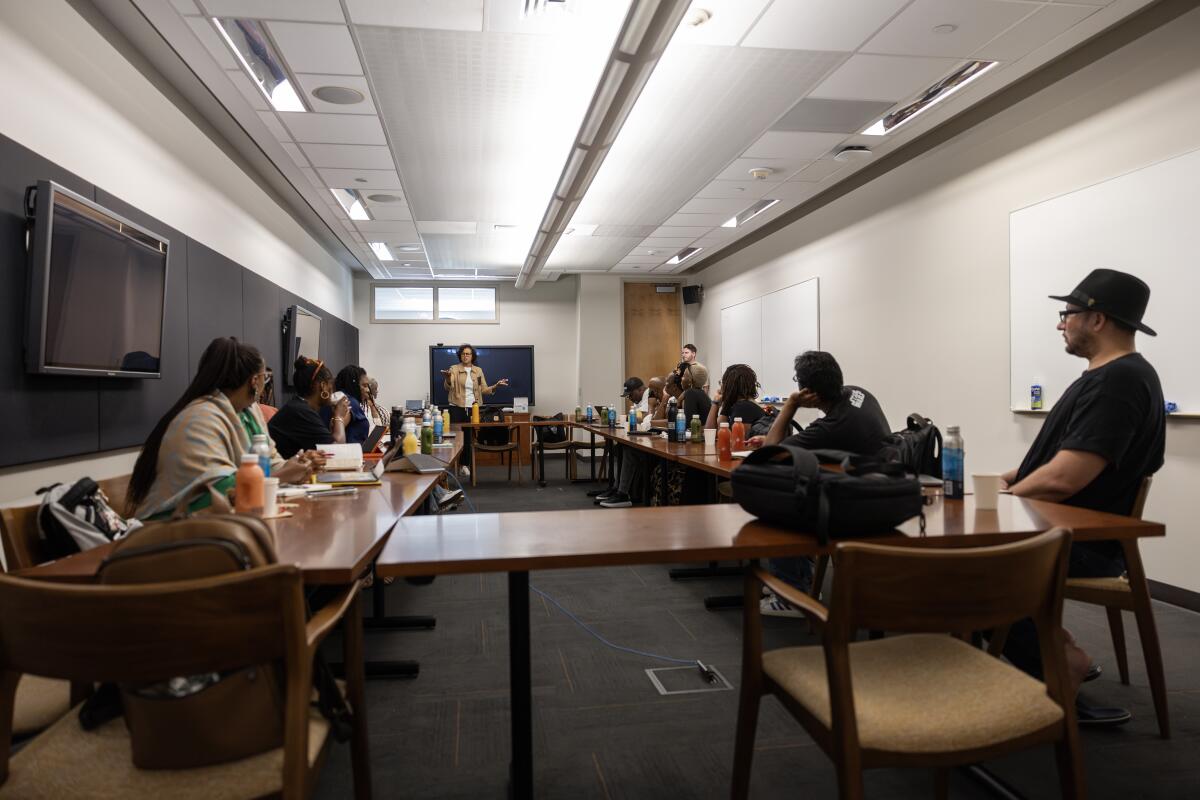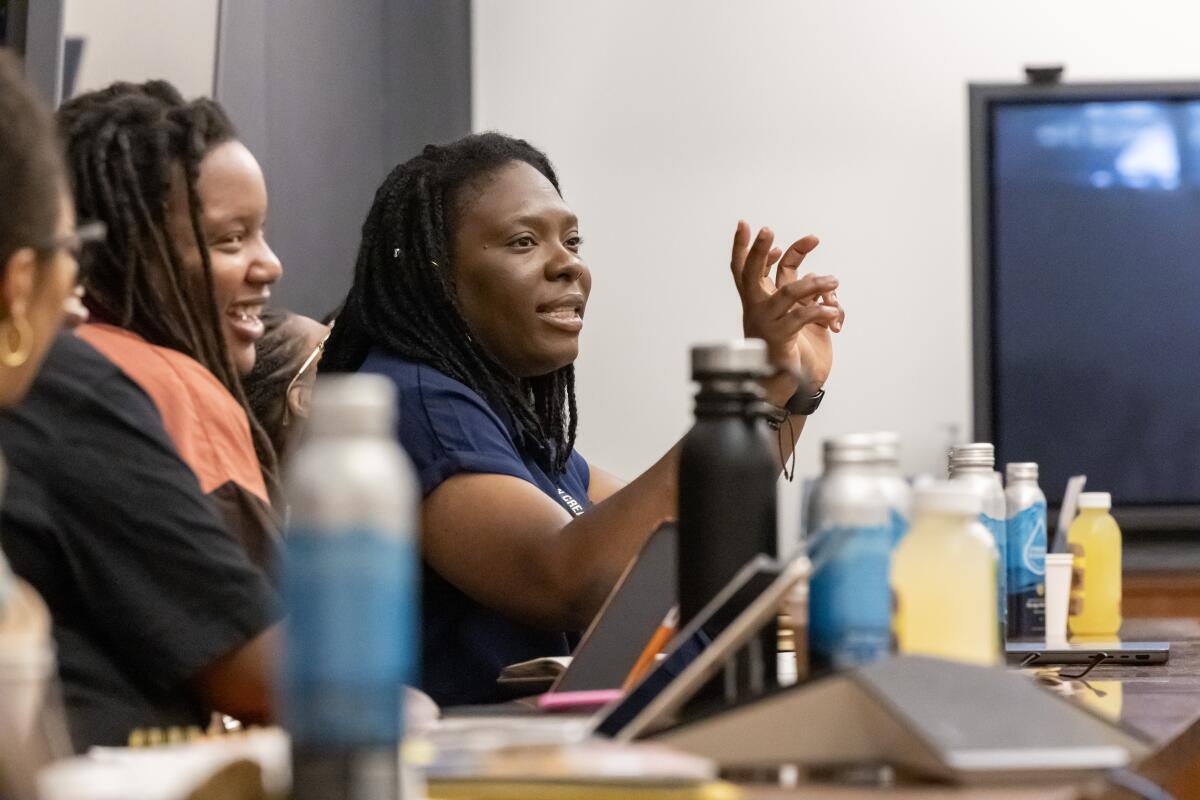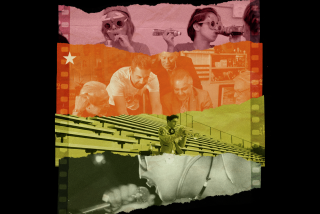As Hollywood and streaming go global, U.S. State Department leans on power of film

Wherever filmmaker Becky Muikia goes, she brings the stories of her native Kenya with her.
They came with her to the NBA All-Star Weekend, where her media and communications company showed its short film âJumping for Changeâ about a Kenyan girls basketball team that fights gender norms.
And this summer, they traveled to Los Angeles, where Muikia attended a program hosted at USCâs School of Cinematic Arts that paired experienced African filmmakers with Hollywood professionals in a five-week cultural exchange of sorts aimed at teaching each group about their respective film industries.
âWe donât have to change who we are or the context of those stories for them to travel,â Muikia, 42, said while sitting on a patio at USC. âThatâs something thatâs really resonated very strongly for us here â being in this market and realizing that we donât have to change our local stories for them to become global stories.â
The success of global TV shows like Netflixâs âSquid Gameâ has proved this concept, making international productions a worthwhile bet for studios. At the same time, itâs also a key area of interest for the U.S. State Department, which funded the program at USC, known as African Creative TV.
The program is supported by a longtime grant called the American Film Showcase that promotes movies and TV as a form of diplomacy and that is one of several initiatives the State Department funds at USC. (Although itâs difficult to determine the full extent of State Department spending on film diplomacy, the American Film Showcase grant awarded to USC typically amounts to about $2 million for a 1½- to two-year period.)
Film diplomacy is not a new concept. During World War II, Hollywood was an integral part of the then-Office of War Information, which commissioned movies â seen as propaganda â from such directors as Frank Capra, William Wyler and John Huston that encouraged patriotism at home and aimed to galvanize Americans into supporting the war effort.
Abroad, American-funded media such as Voice of America and Radio Free Europe was used during the Cold War to broadcast news and shows that prompted positive thoughts about the U.S., said Alexandra Macias, a professor of political science at Cal State Northridge.
Unlike the so-called hard power stance of building up a military or a stock of munitions and weapons to deter global rivals, these kinds of âsoft powerâ diplomatic moves take a more subtle approach. Although the end game is the same â improving the worldâs opinion of the U.S. and thus increasing its national security â the two approaches work together to achieve that goal, she said.
âYou canât just base your security on those hard munitions or military power,â Macias said. âYou also have to get into the hearts and minds, and that is beneficial to you if you donât have people in other countries angry at you.â
After strikes by actors and writers last year, Los Angelesâ entertainment economy is struggling to stage a comeback as production activity, employment and box office revenue are down.
The African Creative TV program began after President Biden hosted a summit in 2022 with African leaders to discuss health and economic issues. In funding this program, the U.S. government is looking to increase jobs in the entertainment industries there and boost African economies, a State Department spokesperson said in a statement.
âWe can have conversations with people that are in those rooms that we want to get into, who have dealt with those budgets that weâre trying to crack, and who have run shows like we want to run them,â said Muikia, who has been in Kenyaâs entertainment industry for 20 years.
Already, American entertainers are increasingly working with counterparts in Nigeriaâs Nollywood film industry, as well as U.S. media and entertainment companies such as Disney, Netflix, Paramount, NBCUniversal, Sony and YouTube to âfuel growthâ across the countryâs creative industries, the State Department spokesperson said.
âThrough film diplomacy, we support broader U.S. foreign policy goals to expand economic equity, including through the creative economy and societal opportunity and inclusion,â according to the statement. âFilm and television not only entertain, but they also provide a way to highlight issues, start conversations about difficult topics, and give voice to those whose stories we may not have heard.ââŻ
In addition to the African Creative TV program, USC also partners with the State Department on a Middle East media initiative and school representatives make 30 to 40 trips a year at the governmentâs behest. USC staffers take filmmakers to different countries to screen their work and host discussions and workshops. (The university has been involved with State Department-led cultural exchange programs for more than 15 years.)

The topics can vary, though science-, technology-, engineering-and math-related movies, such as the 2022 Mars rover documentary âGood Night Oppyâ and 2019âs âWoman in Motionâ about âStar Trekâ actor Nichelle Nichols, are in high demand. Over the years, films about freedom of the press, sports and womenâs rights have also been screened, said Alan Baker, associate dean for international projects and administration at the USC School of Cinematic Arts.
The films donât always paint the U.S. in a positive light. In Malawi, Baker once screened a documentary called âUndefeatedâ that chronicles the struggles of a Black high school football team in Memphis, Tenn., that tries to turn around its losing record. At the end of the screening, a viewer noted that after watching the film and seeing the difficulties the student athletes went through, she realized that America had its share of problems, Baker said.
âIt was really kind of a life-affirming moment, certainly for me, and for our filmmaker,â Baker said.
Back at USC, on a weekday morning in August, about a dozen of the visiting African filmmakers and writers debated among themselves about which Hollywood concepts and practices theyâd want to see adapted for their industries back home and which wouldnât work.
For example, labor unions for creatives, such as the powerful writers or actors guilds? There might not be a place for them in Kenya right now, Muikia mused, but perhaps there was a way to incorporate the sense of community the unions fostered into their film industry.
How about a years-long development for a single show, which is common in the U.S.? âItâs a matter of budget for us,â one filmmaker said, adding that maybe multiple shows could be developed during a three-year process.
In between, the filmmakers and their instructor, TV writer and director Desta Tedros Reff, swapped notes about their favorite English-language shows â the BBC America thriller âKilling Eve,â the sci-fi stalwart âBattlestar Galacticaâ and the HBO fantasy blockbuster âGame of Thrones.â

âIâve always been curious about what the process in Hollywood is like, specifically, and how different that might be from how weâd create stuff in Nigeria,â said Isioma Osaje, a Nigerian producer, writer and director whose production company recently released her time-loop comedy film âJapa!â on Prime Video. âItâs been really cool seeing that stories are essentially the same, and the themes that resonate with Nigerians can resonate here. Itâs just about refining and streamlining.â
Muikia, the Kenyan producer, said she learned more about the economic struggles plaguing the U.S. film and TV industry, which has broadened her thinking about how to get African stories out into the world, whether thatâs through YouTube or perhaps a home-grown video on demand platform.
âIt might not be that someone from the outside will come and give us a solution,â she said. âThe biggest thing for us has been just the reaffirming of the fact that some of these things, weâre going to have to create them ourselves.â
More to Read
Inside the business of entertainment
The Wide Shot brings you news, analysis and insights on everything from streaming wars to production â and what it all means for the future.
You may occasionally receive promotional content from the Los Angeles Times.












